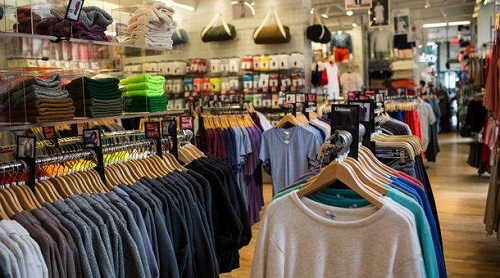"Both department stores and apparel retailers in the US lost ground in 2019 as consumers increasingly turned to online shopping. Worst affected were stores like Macy’s and Gap, along with Kohl’s Corp., L Brands Inc. and Nordstorm Inc., which emerged as the poorest-performing individual stocks on the S&P index. These brands lost most of their market share to online and discount retailers like Ross Stores Inc. and TJX Cos., which owns Marshalls and T.J. Maxx."
 Both department stores and apparel retailers in the US lost ground in 2019 as consumers increasingly turned to online shopping. Worst affected were stores like Macy’s and Gap, along with Kohl’s Corp., L Brands Inc. and Nordstorm Inc., which emerged as the poorest-performing individual stocks on the S&P index. These brands lost most of their market share to online and discount retailers like Ross Stores Inc. and TJX Cos., which owns Marshalls and T.J. Maxx.
Both department stores and apparel retailers in the US lost ground in 2019 as consumers increasingly turned to online shopping. Worst affected were stores like Macy’s and Gap, along with Kohl’s Corp., L Brands Inc. and Nordstorm Inc., which emerged as the poorest-performing individual stocks on the S&P index. These brands lost most of their market share to online and discount retailers like Ross Stores Inc. and TJX Cos., which owns Marshalls and T.J. Maxx.
As per Credit Suisse, over 7,600 stores closed during 2019 and the outlook for 2020 does not look any brighter. However, many US department stores and apparel retailers plan to buck this slowdown and bounce back by closing their stores, shrinking their store sizes and offering more experiences like old-fashioned tailoring and trendy in-store cafes to attract customers.
Department stores to scale down operations
Most department stores will scale down their store fleets. Macy’s, which has about 640 namesake stores, has been gradually closing locations since 2016. Similarly, J.C. Penney, which has about 850 stores in the US, closed a handful of them this year. Due to these closures, the S&P 500 department stores index is set to drop close by around 30 this year, the biggest decline among all S&P 500 industry indices. Like Macy’s and JC Penney, Gap too plans to shut about 230 stores with more focus on Old Navy and Athleta brands. Preppy apparel retailer Abercrombie & Fitch Co. is also closing flagship stores. Retailers who don’t plan to close their stores may shrink their sizes. As Sucharita Kodali, an analyst at Forrester Research reveals, Lord & Taylor plans to introduce new, more compact stores.
which has about 850 stores in the US, closed a handful of them this year. Due to these closures, the S&P 500 department stores index is set to drop close by around 30 this year, the biggest decline among all S&P 500 industry indices. Like Macy’s and JC Penney, Gap too plans to shut about 230 stores with more focus on Old Navy and Athleta brands. Preppy apparel retailer Abercrombie & Fitch Co. is also closing flagship stores. Retailers who don’t plan to close their stores may shrink their sizes. As Sucharita Kodali, an analyst at Forrester Research reveals, Lord & Taylor plans to introduce new, more compact stores.
Focus on new retail experiences
Department stores also plan to reorganise their apparel spaces. They might follow the Nordstrom Local model, which focuses on tailoring, returns and helping customers find a specific look, rather than selling items. They might also focus on setting up their showrooms near recreational spaces like restaurants, bars and cafes. GlobalData research reveals for online thrift store ThredUp, the second-hand apparel market is expected to grow to $32 billion in 2020. This will compel apparel companies to either revise their inventory or join the resellers. Retailers will also collaborate with resellers like ThredUp for selling their collections.
However, the new accounting regulations could impact the income of retailers and department stores from credit cards. Department stores will be affected more as they rely more on credit income. Most hit will be Macy’s followed by Target.












